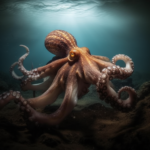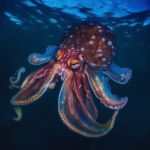Octopuses are fascinating creatures that inhabit the world’s oceans, known for their intelligence and unique abilities. One intriguing question that often arises is whether octopuses eat their own arms. This behavior, known as autophagy, has been observed in certain species of octopuses, but it is not a common occurrence. In this article, we will explore the reasons behind this behavior, the potential benefits it may provide, and the circumstances under which octopuses resort to self-cannibalism. So, let’s dive deeper into the intriguing world of octopuses and uncover the truth behind this curious phenomenon.
Key Takeaways
- Octopuses have been known to eat their own arms in certain situations.
- This behavior is typically seen in stressed or injured octopuses.
- Regeneration of lost arms is possible for octopuses.
- Cannibalism among octopuses is rare but not unheard of.
- Further research is needed to fully understand the reasons behind this behavior.
The Enigmatic World of Octopuses
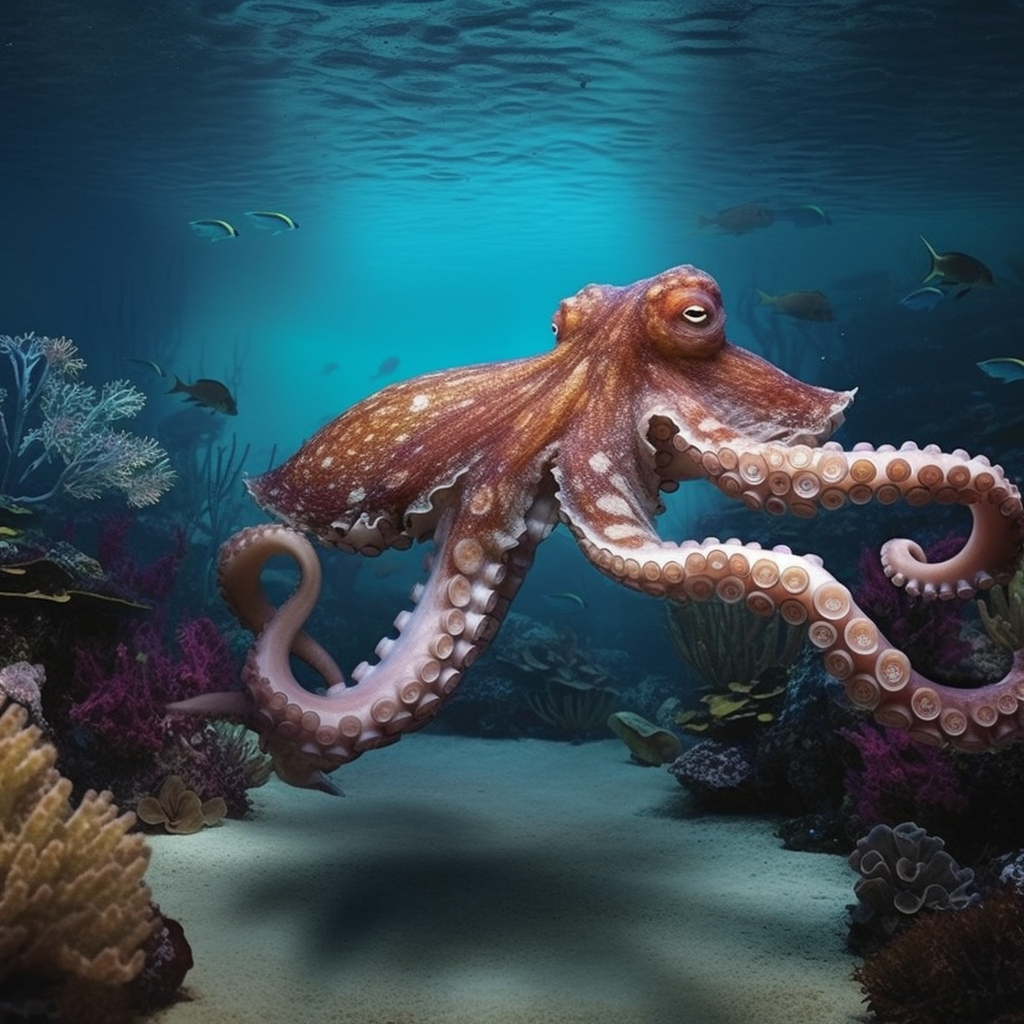
Octopuses are fascinating creatures that inhabit the depths of our oceans. With their unique physiology and intriguing behavior, they have captivated the curiosity of scientists and nature enthusiasts alike. In this section, we will delve into the enigmatic world of octopuses, exploring their behavior and the remarkable abilities of their physiology.
A. Understanding Octopus Behavior
Octopuses are known for their complex and intelligent behavior. These cephalopods exhibit a wide range of fascinating actions, from problem-solving to camouflage. Let’s take a closer look at some of the intriguing behaviors displayed by these incredible creatures:
-
Camouflage: Octopuses are masters of disguise. They possess specialized skin cells called chromatophores that allow them to change color and texture, blending seamlessly with their surroundings. This remarkable ability helps them evade predators and ambush prey.
-
Problem-solving: Octopuses have been observed engaging in problem-solving tasks, demonstrating their cognitive abilities. In laboratory settings, they have shown the capacity to navigate mazes, open jars, and even unscrew lids to access food rewards. These findings suggest a high level of intelligence and adaptability.
-
Tool use: Some species of octopuses have been observed using tools to aid in their foraging. For example, the veined octopus has been observed collecting coconut shells and using them as portable shelters. This behavior showcases their resourcefulness and ability to utilize objects in their environment.
-
Social interactions: While octopuses are generally solitary creatures, they do engage in social interactions, particularly during mating. Male octopuses often display elaborate courtship rituals to attract females. However, once mating is complete, the female typically becomes aggressive towards the male, sometimes even cannibalizing him. This behavior ensures the survival of the female’s offspring.
B. The Unique Physiology of Octopuses
Octopuses possess a physiology that sets them apart from other marine creatures. Their bodies are incredibly flexible, allowing them to squeeze through tight spaces and escape from predators. Let’s explore some of the unique features of octopuses:
-
Regenerative abilities: One of the most remarkable aspects of octopus physiology is their ability to regenerate lost body parts, including their arms. If an octopus is attacked or injured, it can voluntarily detach one or more of its arms as a defense mechanism. The severed arm will continue to move independently, distracting the predator while the octopus escapes. Over time, the octopus can regenerate the lost arm, restoring its full functionality.
-
Complex nervous system: Octopuses possess a highly developed nervous system, with the majority of their neurons located in their arms rather than their brains. This decentralized nervous system allows their arms to exhibit a remarkable level of autonomy and coordination. Each arm can perform complex tasks independently, such as capturing prey or manipulating objects.
-
Autophagy: While octopuses do not typically eat their own arms, they have been observed engaging in a behavior known as autophagy. Autophagy is a stress-induced behavior where an octopus may bite and consume parts of its own body. This behavior is thought to be a response to extreme hunger or stress. However, it is important to note that autophagy is not a common occurrence and is not a regular part of an octopus’s diet.
In conclusion, octopuses are truly fascinating creatures with a wide array of intriguing behaviors and unique physiological adaptations. Their intelligence, problem-solving abilities, and regenerative powers make them one of the most captivating creatures in the marine world. By studying these enigmatic creatures, scientists continue to uncover the secrets of their behavior and unravel the mysteries of their remarkable physiology.
The Phenomenon of Octopuses Eating Their Own Arms
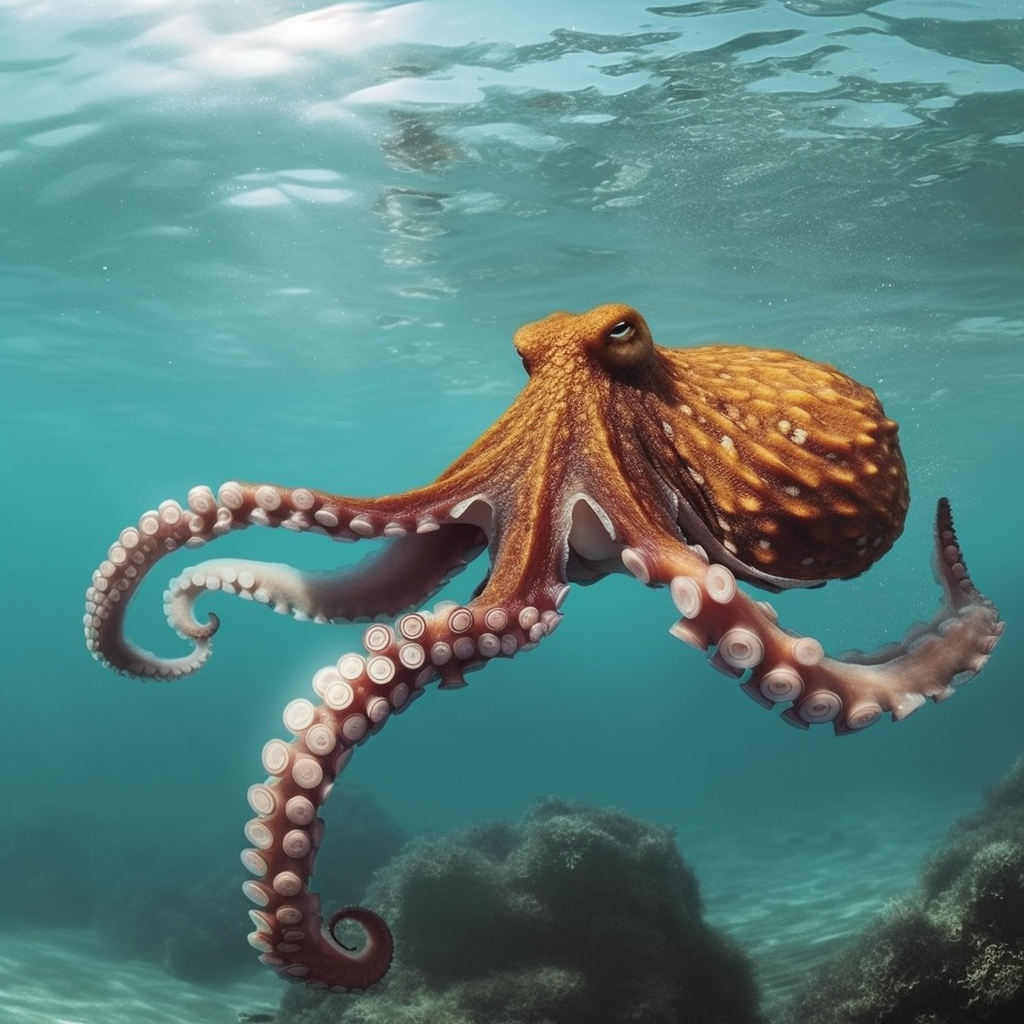
Octopuses are fascinating creatures with remarkable abilities, but one behavior that often perplexes scientists and observers alike is the act of octopuses eating their own arms. This self-cannibalistic behavior is not common among all octopuses, but it has been observed in certain instances. In this section, we will explore the instances of octopuses eating their own arms and delve into the theories behind this intriguing phenomenon.
A. Instances of Octopuses Eating Their Own Arms
While not all octopuses engage in self-cannibalism, there have been documented cases where individuals have been observed consuming their own arms. This behavior is more likely to occur in captivity, where octopuses may experience stress-induced behaviors. One such instance was observed in an octopus named Inky, who resided in the National Aquarium of New Zealand. Inky was known for his intelligence and problem-solving abilities, but he surprised everyone when he was found with a missing arm. It was later discovered that Inky had eaten his own arm, leaving behind only a stump.
Another case of octopus self-mutilation occurred in an aquarium in Germany. A female octopus, known as Heidi, started biting off the tips of her own arms. This behavior puzzled researchers, as Heidi seemed to be in good health and had no apparent reason to engage in self-harm. Despite efforts to prevent further self-mutilation, Heidi continued to consume her own arms, leaving scientists baffled.
B. Theories Behind Why Octopuses Eat Their Own Arms
The act of octopuses eating their own arms raises many questions about their behavior and physiology. Scientists have put forth several theories to explain this phenomenon, but a definitive answer remains elusive.
-
Stress-induced behavior: One theory suggests that octopuses may engage in self-cannibalism as a response to stress. In captivity, octopuses may experience environmental conditions that differ from their natural habitat, leading to increased stress levels. This stress could trigger abnormal behaviors, such as self-mutilation.
-
Autophagy and survival strategy: Autophagy is a process by which cells recycle their own components to provide energy during times of starvation or stress. Some researchers propose that octopuses may resort to self-cannibalism as a survival strategy when food is scarce. By consuming their own arms, they can obtain vital nutrients and prolong their survival until more food becomes available.
-
Regeneration and arm function: Octopuses have the remarkable ability to regenerate their arms. It is believed that by consuming their own arms, they may be able to redirect resources towards regrowth and repair. Additionally, octopus arms serve various functions, including hunting, manipulation, and defense. By sacrificing a damaged or injured arm, an octopus may be able to ensure the overall functionality and efficiency of its remaining arms.
While these theories provide some insight into the possible reasons behind octopuses eating their own arms, more research is needed to fully understand this behavior. Octopuses continue to captivate scientists and enthusiasts alike with their complex behaviors and unique survival strategies. The study of octopus behavior and self-cannibalism sheds light on the fascinating world of marine biology and reminds us of the intricacies of life in the ocean.
Delving Deeper: Do Octopuses Eat Themselves?
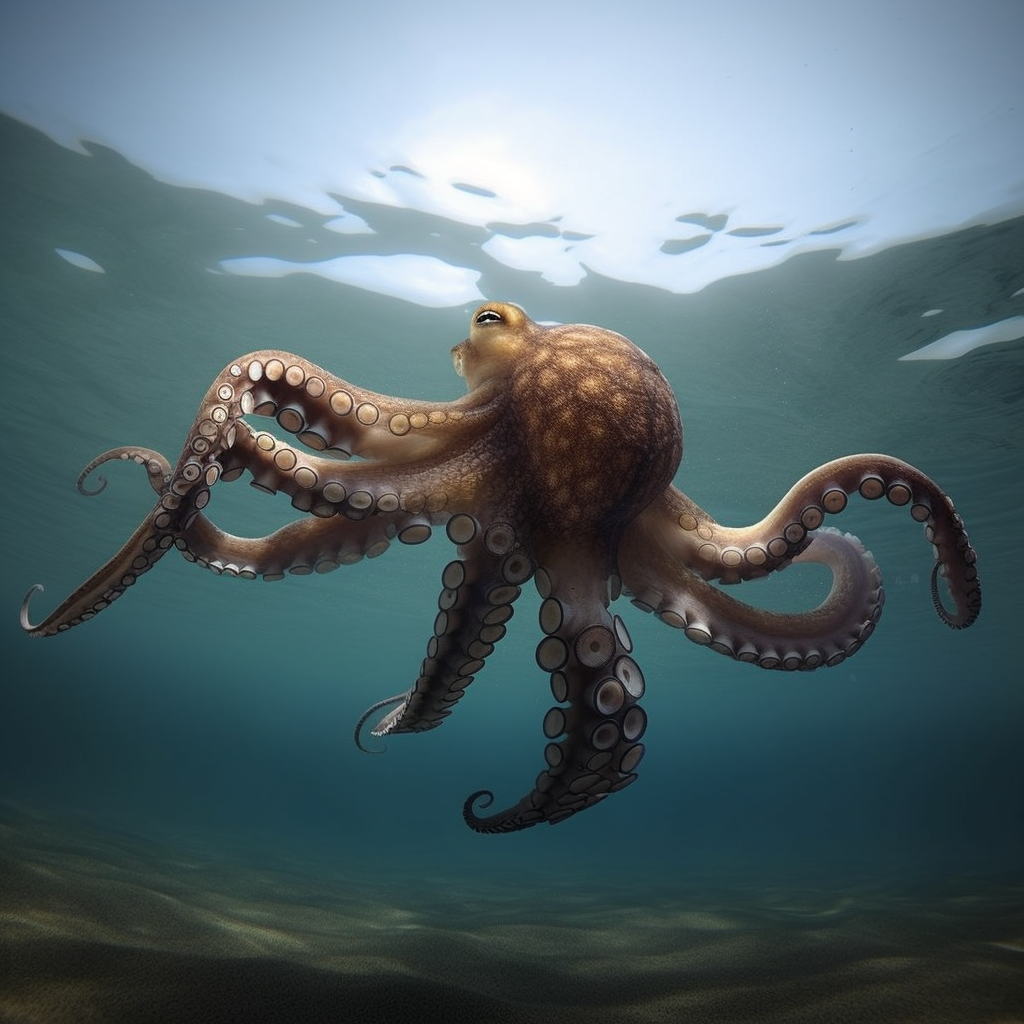
A. Instances and Observations of Octopuses Eating Themselves
Octopuses are fascinating creatures with complex behaviors and survival strategies. One intriguing behavior that has been observed in octopuses is self-cannibalism, where they consume their own arms. While this may seem bizarre and counterintuitive, there have been documented instances of octopuses engaging in this behavior.
One such instance was observed in a laboratory setting, where an octopus in captivity was found to be biting off and consuming its own arm. This behavior was not a result of starvation or stress-induced behavior, as the octopus was well-fed and in a suitable environment. It appeared to be a deliberate act by the octopus.
In another case, a wild octopus was found with a partially consumed arm. This suggests that self-cannibalism may not be limited to captive octopuses but also occurs in their natural habitat. However, it is important to note that these instances are relatively rare and not a common occurrence.
B. Scientific Explanations for Octopuses Eating Themselves
Scientists have been intrigued by this behavior and have proposed several theories to explain why octopuses engage in self-cannibalism. One possible explanation is autophagy, a process where an organism breaks down its own tissues for energy or to recycle nutrients.
Autophagy is a well-known phenomenon observed in various animals, including humans. It is believed to be a survival strategy during times of food scarcity or stress. In the case of octopuses, self-cannibalism could be a way for them to obtain vital nutrients when food is scarce in their environment.
Another theory suggests that self-cannibalism may be a result of autotomy, a natural defense mechanism possessed by octopuses. Autotomy allows octopuses to voluntarily detach their arms as a means of escaping from predators or to distract them while the octopus makes its escape. The detached arm can continue to move and distract the predator, giving the octopus a chance to survive.
In some cases, an octopus may mistakenly bite its own arm during an encounter with a predator or in a stressful situation. Once the arm is detached, the octopus may consume it to regain some of the lost energy and nutrients.
Additionally, hormonal changes in the octopus’s body may play a role in self-cannibalism. Female octopuses undergo significant physiological changes during the reproductive process, including the production of eggs. It is possible that hormonal fluctuations could influence the octopus’s behavior, leading to self-mutilation and arm consumption.
While these theories provide some insight into why octopuses engage in self-cannibalism, further research is needed to fully understand this behavior. The complex nature of the octopus’s brain and its unique survival strategies make it a fascinating subject for study.
In the next section, we will explore the fascinating process of octopus arm regeneration and how it relates to their feeding habits and overall survival strategy. So, stay tuned for the next part of our octopus quiz!
| Octopus Self-Cannibalism: Key Points | |————————————-| | – Octopuses have been observed consuming their own arms. | | – Instances of self-cannibalism have been observed in both captive and wild octopuses. | | – Self-cannibalism may be a result of autophagy or autotomy. | | – Hormonal changes in female octopuses could also contribute to self-cannibalism. | | – Further research is needed to fully understand this behavior. |
Octopuses and Cannibalistic Tendencies
Octopuses are fascinating creatures with complex behaviors and survival strategies. While they are known for their intelligence and remarkable ability to adapt, there have been instances where octopuses exhibit cannibalistic tendencies. In this section, we will explore different scenarios where octopuses have been observed consuming their own limbs, their young, and even their mothers. We will also delve into the intriguing question of whether octopuses eat their partners during mating rituals.
A. Do Octopuses Eat Their Own Legs?
One of the most intriguing aspects of octopus behavior is their ability to regenerate their limbs. In certain situations, an octopus may resort to self-mutilation by biting off one of its own arms. This behavior, known as autotomy, serves as a survival strategy for the octopus.
Autotomy allows the octopus to escape from predators by sacrificing a part of its body. The severed arm continues to move and distract the predator, giving the octopus a chance to flee. Additionally, the lost arm can regenerate over time, ensuring the octopus can function normally again.
B. The Controversial Topic of Octopuses Eating Their Young
While it may seem unsettling, there have been documented cases of octopuses consuming their own young. This behavior is not common among all octopus species, but it has been observed in certain circumstances.
One possible explanation for this behavior is stress-induced behavior. When an octopus is under extreme stress, such as in captivity or when resources are scarce, it may resort to cannibalism as a survival strategy. By consuming their own young, the adult octopus ensures its own survival by obtaining much-needed nutrients.
C. The Unsettling Phenomenon of Octopuses Eating Their Mothers
In some species of octopuses, the mother plays a crucial role in protecting and caring for her eggs. However, there have been instances where the mother octopus has been observed consuming her own eggs.
This behavior is believed to be influenced by hormonal changes in the female octopus. As the eggs develop, the female’s hormone levels fluctuate, which can trigger a change in behavior. It is thought that the consumption of eggs may be a response to stress or a means to regain energy lost during the reproductive process.
D. The Complex Mating Rituals: Do Octopuses Eat Their Partners?
Mating rituals in octopuses can be complex and sometimes involve aggressive behavior. While it is rare for octopuses to consume their partners during mating, there have been a few documented cases.
In certain species, the male octopus may approach the female cautiously, as the female is often larger and more aggressive. If the male is not careful, he may be mistaken for prey and attacked by the female. In some instances, the male may be consumed by the female after mating, providing her with additional nutrients for the development of her eggs.
In conclusion, while cannibalistic tendencies may seem unsettling, they are a part of the complex behaviors exhibited by octopuses. Whether it is self-mutilation, consuming their young, or even their partners, these behaviors serve as survival strategies in certain circumstances. Understanding these behaviors is crucial for further research in the field of marine biology and provides insights into the fascinating world of octopuses.
The Survival Instinct: Why Would an Octopus Eat Its Own Arms?
A. The Role of Stress and Environmental Factors
Octopuses are fascinating creatures with complex behaviors and survival strategies. While it may seem strange, there have been instances where octopuses have been observed eating their own arms. This behavior is not common, but it does happen, and scientists have been trying to understand why.
One possible explanation for this behavior is stress. Like any other animal, octopuses can experience stress due to various environmental factors. Stress can be caused by changes in their habitat, such as temperature fluctuations, pollution, or the presence of predators. It can also be induced by captivity or other forms of confinement.
When an octopus is under stress, it may exhibit abnormal behaviors, including self-mutilation. In some cases, this can involve the octopus biting off and consuming its own arm. This behavior is believed to be a response to extreme stress, as the octopus tries to cope with its environment.
B. The Theory of Autophagy in Octopuses
Another theory that scientists have proposed to explain why octopuses eat their own arms is autophagy. Autophagy is a process that occurs in many organisms, including humans, where cells break down and recycle their own components.
In the case of octopuses, autophagy could be a survival strategy. When an octopus is faced with starvation or a lack of food, it may resort to consuming its own arm as a source of nutrients. By breaking down and recycling the tissues in its arm, the octopus can sustain itself until it finds a new food source.
Autophagy in octopuses is still not fully understood, and more research is needed to determine the exact mechanisms behind this behavior. However, studies have shown that octopuses have the ability to regenerate their arms, which supports the idea that consuming their own arms is a survival strategy rather than a self-destructive behavior.
In conclusion, while it may seem strange and even gruesome, octopuses eating their own arms can be attributed to stress and the need for survival. These behaviors are not common, but they provide valuable insights into the complex nature of these intelligent creatures. Further research is necessary to fully understand the mechanisms behind these behaviors and their implications for octopus survival strategies.
The Human Perspective: How Do We Understand These Behaviors?
A. Comparing Octopus Behavior to Other Animals
When it comes to understanding the behaviors of octopuses, scientists often compare them to other animals to gain insights into their unique characteristics. While many animals exhibit fascinating behaviors, the octopus stands out due to its remarkable ability to regenerate its arms. This ability is not commonly observed in other animals, making the octopus a subject of great interest in the field of marine biology.
Octopuses belong to the cephalopod family, which includes squids and cuttlefish. These creatures are known for their intelligence and complex behaviors. By studying the behavior of octopuses, scientists can gain a deeper understanding of the intricate workings of the animal kingdom.
B. What Can We Learn From Octopus Behavior?
Octopus behavior offers valuable insights into various aspects of animal behavior and survival strategies. By examining their unique behaviors, scientists can unravel the mysteries of the natural world and potentially apply these findings to other areas of research.
-
Autophagy in Marine Life: Autophagy, the process by which cells recycle their own components, is a phenomenon observed in various organisms, including octopuses. Understanding how octopuses utilize autophagy to survive in their natural habitat can provide valuable information about the role of this process in other marine species.
-
Stress-Induced Behavior in Octopuses: Octopuses are known to exhibit stress-induced behaviors, such as self-mutilation and arm consumption. By studying these behaviors, scientists can gain insights into how stress affects animals and potentially apply this knowledge to improve animal welfare in captivity.
-
Octopus Arm Regeneration: The ability of octopuses to regenerate their arms is a fascinating area of study. By investigating the mechanisms behind arm regeneration, scientists hope to uncover valuable information about tissue regeneration in other animals, including humans.
-
Octopus Feeding Habits: Octopuses have diverse feeding habits and are known to be opportunistic predators. Studying their feeding behaviors can provide insights into the complex interactions between predators and prey in marine ecosystems.
-
Cephalopod Nutrition: Octopuses have specific nutritional requirements to support their unique physiology. Understanding their nutritional needs can contribute to our knowledge of marine food webs and the importance of maintaining a balanced ecosystem.
In conclusion, comparing octopus behavior to that of other animals allows us to gain a broader understanding of the natural world. By studying their behaviors, scientists can uncover valuable insights into autophagy, stress-induced behaviors, regeneration, feeding habits, and nutrition. The knowledge gained from these studies can have far-reaching implications, from improving animal welfare to advancing our understanding of the intricate workings of the animal kingdom. Conclusion
In conclusion, while it may seem strange and even gruesome, octopuses do have the ability to eat their own arms. This behavior, known as autophagy, is not a common occurrence in octopuses, but it has been observed in certain situations. Octopuses may resort to self-cannibalism when they are under extreme stress, such as when they are injured or starving. By consuming their own arms, octopuses can regain some energy and nutrients that they desperately need to survive. However, it is important to note that this behavior is not a regular part of their diet and is only a last resort. Octopuses have remarkable regenerative abilities, and they can regrow their lost arms over time. This incredible adaptation allows them to recover from self-inflicted injuries and continue their lives in the ocean. Overall, while the idea of an octopus eating its own arm may be shocking, it is just another fascinating aspect of these intelligent and adaptable creatures.
Frequently Asked Questions
1. Do octopus eat their own arms?
Yes, octopuses have been known to eat their own arms, a behavior known as autophagy. This is often a stress-induced behavior and is considered a form of self-mutilation. However, octopuses are capable of regenerating their arms, so this does not cause permanent damage.
2. Why do octopus eat their own arms?
Octopuses eat their own arms usually due to stress or poor health. This behavior, known as autophagy or self-cannibalism, is a survival strategy that is not fully understood. Some scientists believe it might be a response to a damaged or diseased arm, while others think it could be a reaction to extreme hunger.
3. Do octopus eat their young?
While it is not common, there have been instances of octopuses eating their young. This behavior is usually observed in situations of extreme stress or scarcity of food. It’s part of their survival strategy, although it’s not a regular part of their diet.
4. Why would an octopus eat its own arms?
An octopus might eat its own arms as a response to extreme stress or disease. This behavior, known as autophagy, is a form of self-cannibalism. It’s a survival strategy that allows the octopus to consume nutrients when food is scarce.
5. Do octopus eat their mother?
There are no documented cases of octopuses eating their mother. However, in extreme situations, octopuses have been known to resort to cannibalism, but this is not a common behavior.
6. Why do octopus eat themselves?
Octopuses eat themselves, a behavior known as autophagy, usually due to extreme stress or disease. This self-cannibalism is a survival strategy that allows the octopus to consume nutrients when food is scarce.
7. Do octopus eat their own legs?
Yes, octopuses can eat their own legs. This behavior is a form of autophagy, or self-cannibalism, and is often a response to stress or disease. However, octopuses can regenerate their legs, so this behavior does not cause permanent harm.
8. Why do octopus eat their partner?
There are documented cases of female octopuses eating their mates after copulation. This behavior is thought to be a survival strategy, providing the female with nutrients needed for the energy-intensive process of laying and caring for eggs.
9. Do octopus eat their babies?
While it is not common, there have been instances of octopuses eating their young. This behavior is usually observed in situations of extreme stress or scarcity of food.
10. What do octopuses eat apart from their own arms?
Octopuses are carnivores and their diet mainly consists of crabs, shrimp, lobsters, fish, and other small marine creatures. They use their beak-like mouth to crack open the hard shells of their prey. Self-cannibalism is not a regular part of their diet and usually occurs under extreme stress or disease conditions.


